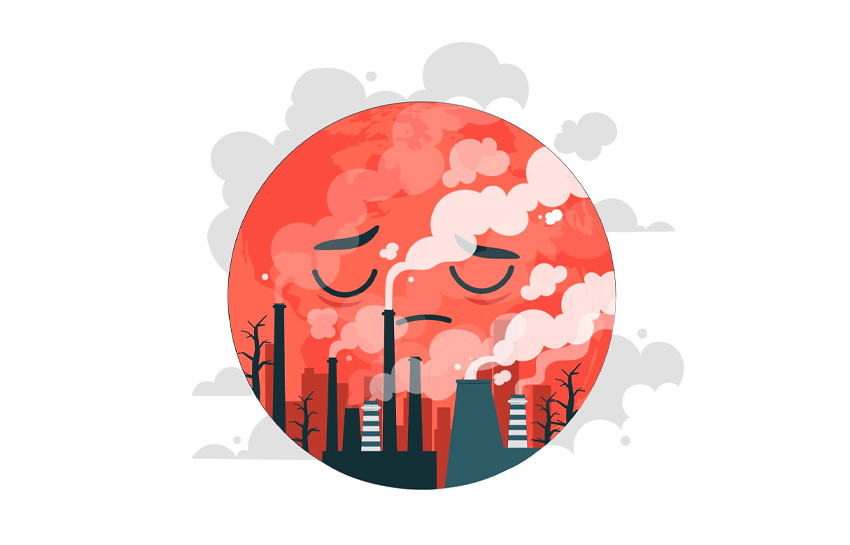
Early Methane Detection Can Help Fight Global Warming
Methane is one of the greenhouse gases trapping the sun's heat in the atmosphere, thus causing average global temperatures to rise to alarming levels. Methane is the second most common greenhouse gas after carbon dioxide, accounting for 20% of global emissions. However, methane is more potent than carbon dioxide at trapping heat. Studies reveal over 20 years; methane gas is 80 times more potent at warming the planet than carbon dioxide.
Undoubtedly, cutting methane emissions is one of the most cost-effective and quick ways to reduce the rising global temperatures. This blog looks at the impacts of methane in the atmosphere and why early detection is vital in the battle against global warming.
Sources of Methane
A range of human-influenced and natural sources produces methane. Approximately 50% of the emissions come from the following sources:
- Oil and gas systems: Normal operations can emit methane, such as routine maintenance and system disruptions in the oil and gas industry. Leaks in equipment and machinery can also produce methane.
- Landfills: Methane production comes from the decomposition of organic waste under anaerobic conditions, usually present in dumpsites and landfills.
- Wastewater: The decay of organic materials that decompose in anaerobic environments in wastewater treatment facilities can also emit methane gases.
- Coal mines: Active and abandoned underground and surface mines can produce methane. Emissions can also occur from post-mining activities, such as coal processing, transportation, and storage.
- Agriculture: Another typical source of methane is agriculture. Methane can be emitted through the decomposition of poultry and livestock manure stored or treated in systems that promote anaerobic conditions.
Effects of Methane in the Atmosphere
Methane is the main contributor to ground-level ozone. The ground-level ozone is a highly toxic air pollutant that causes 1 million premature deaths each year. As mentioned earlier, methane is also a powerful greenhouse gas driving global warming and climate change that the world is experiencing today. Effects of methane-triggered global warming include:
- Frequent and severe weather, which leads to disasters, such as storms, heatwaves, floods, and droughts.
- Higher death rates due to temperature spikes
- Worsened air pollution
- Higher wildlife extinction rates
- Higher sea levels
- More acidic oceans
Early Detection of Methane Leaks Can Avoid Contributing to Global Warming
Methane, the invisible greenhouse gas, has been leaking in various environments, including both active and retired oil and gas facilities for decades. In the past, operators encountered difficulties detecting, monitoring, and measuring leaks. But today, technology is providing tools to detect leaks from even the most remote locations, so individuals can take urgent remedial action. Finding leaks in time can help reduce the amount of methane reaching our spaces and boost the war against global warming.
Importance of Digitization in Process Improvement
Technology and digitization have opened new possibilities in the current fight against global warming by improving production processes and communication. The oil and gas industry are now turning to digital tools to detect, measure, and monitor methane leaks in hazardous and remote locations. Technologies, such as advanced sensors, machine learning, the industrial Internet of Things (IoT), and big data analytics can predict, detect, and prevent methane leaks that eventually find their way to the atmosphere.
Aegex Digitization Tools Can Help You Manage Leaks
With the rising alarm about methane's role in driving global warming, Aegex has developed intrinsically safe and certified tools to detect even relatively small leaks in hazardous environments. Aegex digitization tools, like the top-rated NexVu IoT solution, come with top-notch features and functionalities, such as smart sensors, endpoints, and radios to provide accurate methane detection, measurement, and monitoring. This allows users to make timely data-driven decisions that help cut down on methane emissions.
Aegex also provides the Aegex10 Intrinsically Safe Tablet that features a fully integrated Windows 10 platform and data-driven predictive maintenance technologies to enable real-time communion and data management in remote and dangerous locations. This boosts efforts to detect and monitor methane leaks in any location, including abandoned wells and mines.
Aegex Tools Help in the War Against Global Warming
Methane is a dangerous gas with massive impacts that cut across all spheres of life. Reducing methane leaks and emissions is integral to slowing down the rate of global warming and preventing unnecessary loss of lives. Aegex technology provides the oil and gas industry and regulators with solutions that autonomously detect methane leaks in perilous locations and remote areas using sensors, infrared cameras, artificial intelligence, IoT, and machine learning. Contact us today to learn more.
